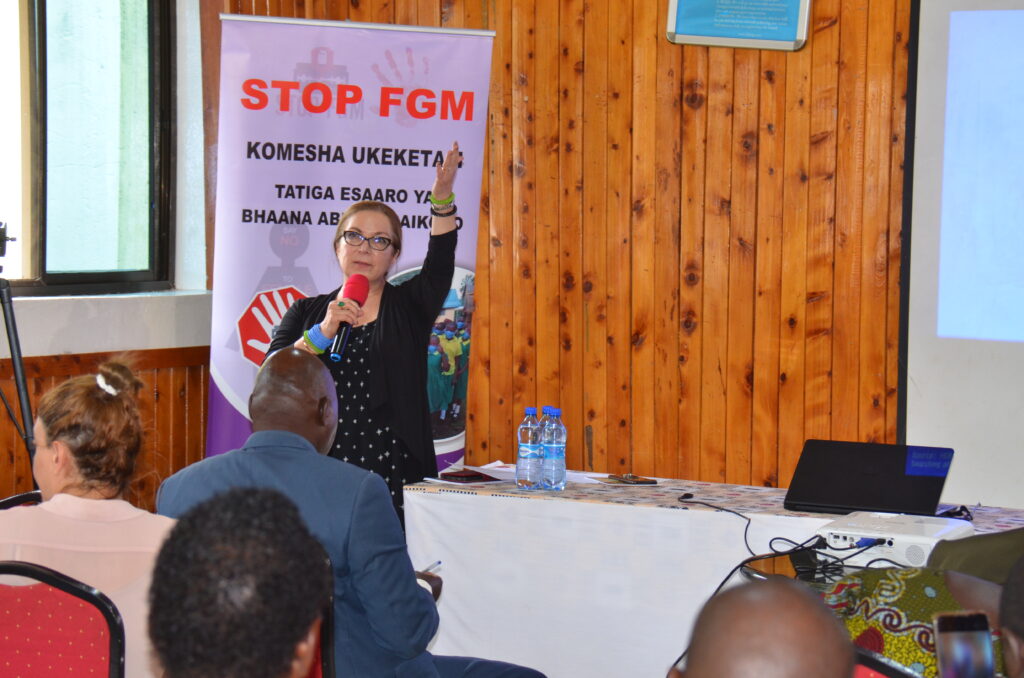Continued emerging trends in Female Genital Mutilation have driven anti-FGM activists to change tactics in addressing the vice prevalence.
The newly deployed strategies by activists involve engaging the girls from the affected regions in Person-centred communication.
The Person-centred communication for FGM prevention is designed to empower individuals, especially young girls directly and communities to abandon the practice of FGM.
Through this method, individuals are encouraged to explore the main reasons for supporting FGM and to reassess beliefs about the practice.
These reasons are then contrasted with facts.
In new strategies, local activists working with Last Mile4D (LM4D), a non-profit organisation based in Washington, DC have gone the girl-child-sensitization way.
Women and young girls are subjected to an assessment in form of a learning session to explore their health understanding of FGM practice.
The LM4D designs and implements education and training programs focusing on the health and safety of women and girls.
These target groups live in the most remote and underserved areas, hence the tag “Last Mile.”
The approach is more result oriented as it is a way of dealing with the vice from the first-person perspective before the act.
New trends in FGM
Recent engagements by activists have revealed how the new trends embraced by FGM practitioners make it impossible to fully expunge the vice.
The revelations come just as the Presidential decree to have FGM end by 2022 nears its deadline.
New evolving trends in FGM include the medicalization of FGM where cutters claim to be using anaesthetics hence no pain to the victim.
Our approach is to work with local partners in Last Mile communities like Kuria and Pokot communities
Harrison
Others include conducting FGM on infants of about 10 days old and cross-border FGM which is flourishing between the Kenya and Tanzania border
In Kenya, LM4D works in West Pokot and Migori (Kuria region) where communities practising FGM are found.
The said communities are found to be disconnected from health and other infrastructure such as roads, running water or hospitals.
According to Mahnaz M. Harrison – Founding President and CEO of the LM4D, results will be gained when small girls have first-hand information on why the vice is endangering their lives.
“Our approach is to work with local partners in Last Mile communities like Kuria and Pokot communities,” says Ms Harrison.
She continued, “we want to ensure women and girls have the knowledge, access to information and agency to exercise their rights to health and safety.”

Person-centred communication gains
Ms Harrison outlines that person-centred communication with girls has enhanced openness in sharing issues that are affecting them.
In addition, girls learn to speak up for themselves and this has helped in giving out relevant information when they are faced with threats from home.
“We engage girls through performing theatricals like orating poems with messages asking the community not to subject them to cutting,” said Ms Morrison.
It is interesting to note that girls are brought up in an environment where undergoing the cut is a rite of passage to adulthood.
However, the LM4D have managed to change this narrative by encouraging the girls to plant a tree for every girl not cut.
The course has brought a lot of determination from among the girls themselves who are in dying need to plant their trees.
Security risks and government agencies
Although, direct engagement has not been easy, especially in finding girls in areas where schools are far apart or where there are no schools completely.
This has forced them to approach community centres which are not safe spaces to talk about FGM, hence sometimes pose a lot of security risks.
So far a total of 2500 girls from 10 schools in Migori County have been engaged with 500 other girls from five schools in West Pokot County.
With the mandate of erasing FGM in the country being an inclusive agenda, the inclusion of National Government Administrative Officers (NGAO) has been fruitful.
In the Kuria region, the NGAO team headed by the Kuria West Deputy County Commissioner Mr Andrew Mwiti outlined increased border patrols to curb cross-border FGM, an emerging trend.
According to Mr Mwiti, in December 2021, the coordination of the NGAO fraternity resulted to arrest of 60 FGM culprits with over 300 girls rescued.
However, the advent of Covid-19 and the 2022 general elections disrupted the push for the 2022 timeline, activist are still hopeful that the 2030 global community goal will be met.
Additionally, FGM cases will be close to zero if all officials stick to what they are promising to do during the anticipated December cutting.
